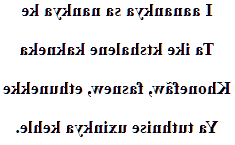Yatê love poem
Sa nankya
I aanankya sa nankya ke
Ta ike ktshalene kakneka
Khonefãw, fasnew, ethunekke
Ya tuthnise uxinkya kehle.


→ French poem ←
Yaathe language
Yatê (yatê-fulniô, yaathe, yahthe, fulniô, carnijó, carijó, fornió, furniô, autonym ia-tê) love poetry ... in an isolated language from the region of Águas Belas in Pernambuco state, Brazil.
There are two fulniô dialects, which are really very close, yatê and fulniô. These two dialects, count together, not more 1,000 speakers.
The Amerindians of Águas Belas were the Carnijós (Carijós), and it was probably during the displacement of populations to constitute villages, that some groups merged and took the name Fulni-ô. Yahthe (our mouth) is the name that the Fulniô Indians give to their language.
It is in the North-East of Brazil that the indigenous peoples, in particular by assimilation, have been the greatest victims of acculturation and the loss of their language. The Fulni-ô of Águas Belas were the only ones because of their bilingualism with Portuguese to maintain it.
But today, if all Fulni-ô Indians speak Portuguese, in contact with the modern society, they gradually lose their bilingualism, and with it, their culture and language. Many now only speak Portuguese in family, and when they speak Yatê, their language is more and more infiltrated by the Portuguese language.
Fulni-ô people
The tradition of these Indians says that originally they lived on the coast, but when the colonizers arrived, they had to flee inland. Then, some of their ancestors who belonged to several clans (Foklasá, Fola, Brogodá), livng in the valley of the Ipanema river came together.
The merger of these different groups probably dates from the 18th century, when it was common to regroup several groups in the same village, or to divide them in different villages.
The Fulnios today are an acculturated ethnic group, mixed with other ethnic groups. They live with farming, hunting and the sale of some basketry work.
Among the Fulni-ô, the Ouricuri ritual remains important. This ritual takes place in August, it is sacred and secret, even if foreign visitors can observe certain dimensions (for example the separation of men and women).
Those who participate in Ouricuri can be considered Fulni-ô. This recognition of being Fulni-ô guarantees the right of ownership over indigenous lands.